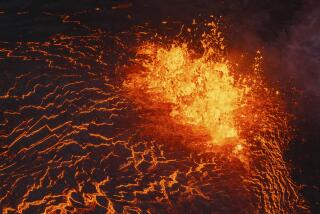Greenland ice sheet undergoes worst surface melt in 123 years
During a four-day period earlier this month, 57% of the surface of the Greenland ice sheet melted, bringing the total melted area to 97% of the surface, according to NASA.
The melting is the worst that has been observed since researchers have been monitoring the ice sheet, the agency said in a statement posted on its website. According to records from ice cores, it is the worst melt since 1889.
But what particularly surprised scientists was the speed with which the melt occurred. When Son Nghiem of Jet Propulsion Laboratory first observed the data from the Oceansat-2 satellite on July 12, he thought there was a mistake. “This was so extraordinary that at first I questioned the result: Was this real or was it due to a data error?” he said.
It was only when researchers combined the Oceansat-2 results with data from two other satellites that they became convinced it was accurate. The data showed that, on July 8, about 40% of the surface of the ice sheet had melted. By July 12, 97% had melted.
The extreme melt coincided with an unusually strong ridge of warm air, or a heat dome, over Greenland. The ridge was one of a series that has dominated Greenland’s weather since the end of May. “Each successive ridge has been stronger than the previous one,” said climatologist Thomas Mote of the University of Georgia in Athens. The most recent one reached Greenland on July 8, then remained stationary beginning three days later. By June 16, it had begun to dissipate.
On average, about half of the surface of the ice sheet melts every summer. The parts at high altitudes refreeze relatively quickly, while liquid from lower elevations runs off into the ocean to be replenished in winter. It is not yet clear whether enough water from the current melt entered the ocean to affect sea levels.
The unexpected melt is not the only event affecting Greenland this month. A massive iceberg twice the size of Manhattan calved from Greenland’s Petermann glacier July 16.
For the record, 4:55 p.m. July 27: An earlier version of this post said 47%, rather than 57%, of the surface of the Greenland ice sheet melted in a four-day period.
For the record, 10:45 a.m. July 30: The headline on an earlier version of this post said “Greenland Ice Sheet Undergoes Worst Surface Melt in 132 Years.” It should be “123” years.






